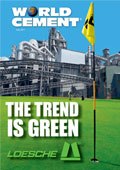Editorial comment
When you think about minerals, the chances are you are thinking about limestone, gypsum and related raw materials, but there are many other minerals and metals involved in the manufacturing process and they are not all so easy to come by. I’m referring to things like tungsten, tantalum, gold and tin – things that go into the equipment you use, your computers, handheld electronic devices, and even the hardfacing protecting your machines from wear. Although other sources are available, all four of these are mined in the Democratic Republic of Congo, a country in crisis. The civil war that has been raging here since 1998 is said to be the most lethal conflict since World War II, with millions already killed and approximately 45 000 dying every month in the most brutal ways imaginable. Like the diamonds of Sierra Leone brought to public notice by the film Blood Diamond, trade in ‘blood minerals’ is reported to be fuelling this barbaric war.
Register for free »
Get started now for absolutely FREE, no credit card required.
The conflict minerals movement is pushing manufacturers that utilise these products to make sure that they are buying ‘clean’. The Enough Project, a
US-based organisation aiming to put an end to genocide, together with Raise Hope for Congo, is pushing for global legislation. Recently, the World Gold Council has stepped up to the plate with a draft standard for consultation. On the release of this, the Council stated: “The World Gold Council believes that gold must be a source of economic and social development wherever it is found and that any possibility for gold to fund conflict must be eradicated. Our member companies and leading refiners have been working to devise a system to identify how newly-mined gold should be certified as being ‘conflict-free’ and so aim to exclude ‘conflict gold’ from the market.”
Meanwhile, the Electronic Industry Citizenship Coalition and Global e-Sustainability Initiative have jointly launched a Conflict Free Smelter (CFS) Assessment Program. In this voluntary programme, the smelter’s procurement activities are independently evaluated to determine if the materials processed originate from conflict-free sources, thereby enabling manufacturers to source ‘clean’ minerals. It is an integral step if end users are ever to be able to make an informed choice – up to now, much as manufacturers such as Apple and Motorola would like to insist on conflict-free, the measures have not been in place for them to do so, particularly given the lengthy supply chain of some of the products in question. If such programmes are not implemented successfully, it could spell disaster for the African minerals industry as a whole, which is already suffering as a result of the red tape related to this programme and the Dodd-Frank legislation passed in the US last July. Reportedly, some US manufacturers are now avoiding African minerals altogether – not exactly the intended outcome.
More locally, the DRC’s Katanga province has begun to promote itself as a source of conflict-free minerals. The province does not carry out trade with neighbouring provinces where conflict exists, and has begun to develop a mineral tracing system to win consumer trust. Such schemes will require corporate backing, which will no doubt cause concern over a conflict of interests. It has the makings of a vicious circle.
So, now that I have given you one more thing to worry about – if economic downturns and emissions legislation, not to mention the day-to-day plant worries weren’t enough – I will leave you with one of our most popular features of the year: the World Review.


